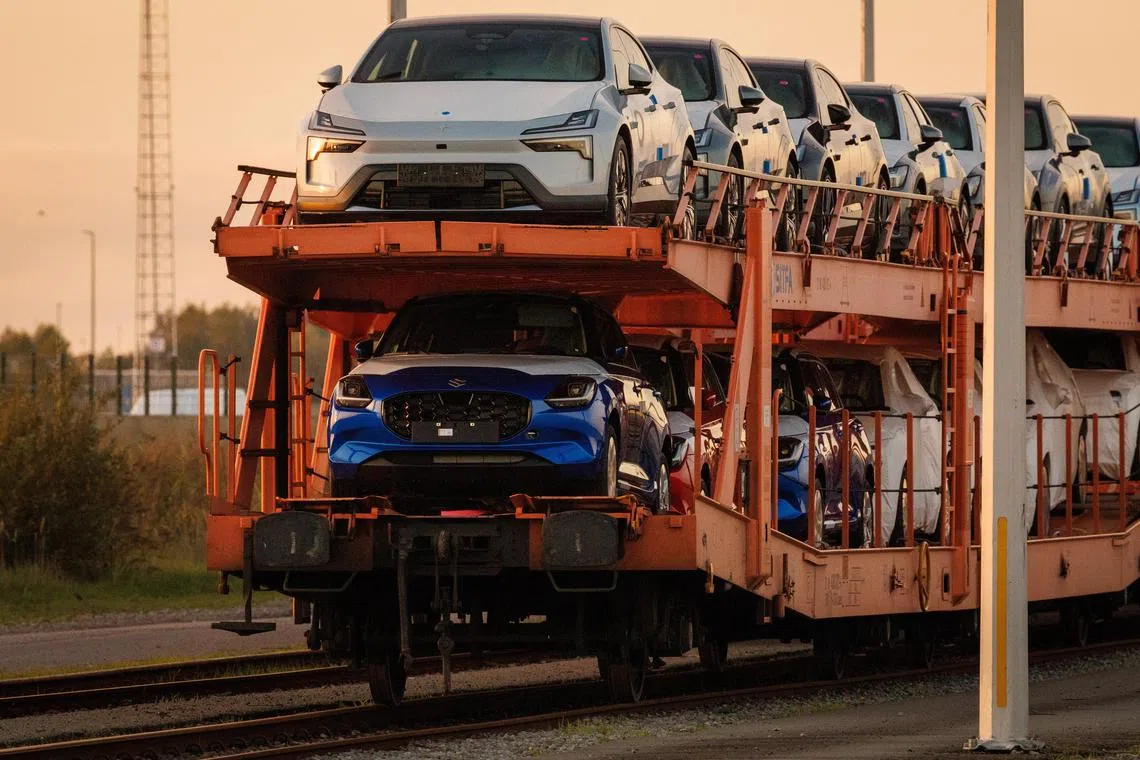China tells carmakers to pause investment in EU countries backing EV tariffs, sources say
Sign up now: Get ST's newsletters delivered to your inbox

New EU tariffs of up to 45.3 per cent on Chinese-built EVs came into effect on Oct 30.
PHOTO: EPA-EFE
SHANGHAI – China has told its carmakers to halt big investment in European countries that support extra tariffs on Chinese-built electric vehicles (EVs), two people briefed about the matter said, a move likely to further divide Europe.
The new European Union tariffs of up to 45.3 per cent
Ten EU members including France, Poland and Italy supported tariffs in a vote in October, in which five members including Germany opposed them and 12 abstained.
Chinese carmakers including BYD, SAIC and Geely were told at a meeting held by the Ministry of Commerce on Oct 10 that they should pause their heavy-asset investment plans, such as for factories, in countries that backed the proposal, said the sources.
Several foreign carmakers also attended the meeting, where the participants were told to be prudent about their investments in countries that abstained from voting and were “encouraged” to invest in those that voted against the tariffs, the sources said.
Geely declined to comment. SAIC, BYD and the Ministry of Commerce did not immediately reply to requests for comment.
The move by the Chinese authorities to suspend some investment in Europe would suggest that the government, keen to avoid a sharp fall in EV exports to the key market, is seeking leverage in talks with the EU over an alternative to tariffs.
Europe accounted for more than 40 per cent of EVs shipped from China in 2023, according to Reuters’ calculations using data from the China Passenger Car Association.
Given the 100 per cent tariffs on Chinese-made EVs in the United States and Canada, a drop in EV exports to Europe would risk deepening overcapacity Chinese automakers face in their home market.
Investments in Europe
During a visit to China by Spanish Prime Minister Pedro Sanchez in September, a Chinese company agreed to build a US$1 billion (S$1.3 billion) plant in Spain to make machinery used for hydrogen production. Spain was one of the 12 EU states that abstained.
Italy and France are among EU countries that have been courting Chinese carmakers for investments, but they have also warned of the risks that a flood of cheap Chinese EVs poses to European manufacturers.
State-owned SAIC, China’s second-largest vehicle exporter, is choosing a site for an EV factory in Europe and has been separately planning to open its second European parts centre in France in 2024 to meet growing demand for its MG-brand cars.
The Italian government is in talks with Chery, China’s largest carmaker by exports, and other Chinese carmakers, including Dongfeng Motor, about potential investments.
BYD is building a plant in Hungary, which voted against the tariffs. The Chinese EV giant has also been considering relocating its European headquarters from the Netherlands to Hungary due to cost concerns, two separate people with knowledge of the matter said.
Even before Beijing issued its guidance, Chinese companies were cautious about independently setting up production sites in Europe, as it requires large sums of investment and a deep understanding of local laws and culture.
The carmakers were also told at the Oct 10 meeting that they should avoid separate investment discussions with European governments and instead work together to hold collective talks, the sources said. REUTERS


